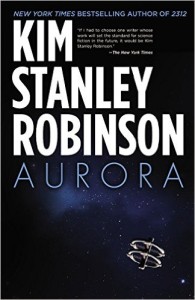 Aurora, by Kim Stanley Robinson
Aurora, by Kim Stanley Robinson
Synopsis: A generation ship arrives at the world it is supposed to colonize, and finds it uncolonizable.
Book Review: I like grimdark, and I like enthusiastic exuberant fiction. I don’t consider this contradictory, because both types of fiction make you feel something strongly, even if the emotions are dissimilar. What I want out of fiction is to be made to feel some suite of emotions intensely. Aurora is the opposite of that.
Aurora’s nominal protagonist is dull, in multiple senses of the word. She is literally dumb, described and shown to be of below average intellect. She has no ambition, and has very little to contribute to anything. She drifts about the ship, relying on the fact that her mother is incredibly important and famous. In the rare cases that that fails, she defaults to her stunning good looks and above-average physical size to get what she wants. It’s like reading a novel about Paris Hilton in space. Not the real Paris Hilton, the savvy business-woman; but rather the bimbo Paris-Hilton-caricature she played on her TV show, that was barely smart enough to draw breath and relied on her wealthy father and good looks to flounce through life. This is not a protagonist I care about.
The narrator of the story is the ship’s AI (referred to as “Ship”). Robinson takes full advantage of his narrator’s lack of emotion and literal outlook to present us with the most clinically detached prose one could write. Now, I must acknowledge his skill in doing so – I don’t think anyone could write something this detached and dry on accident, it must have taken some skill! But the fact remains that the entire (first half of) the novel reads like those terrible History textbooks back when no one knew how to write an engaging textbook. Lists of facts and events and dates, with nothing compelling about them. Every time an emotional scene could be shown, it is summarized in a couple sentences instead. Every time there could be action, it is belavored into a dry recounting of cause-and-effect.
There is a period where the AI introspects deeply upon language and its purpose. The nature of metaphor, etc. This section was extremely interesting, in fact the only interesting thing in the (first half of) the novel! Unfortunately it is soon abandoned, and not touched on again. The AI doesn’t seem to learn anything about story telling from it, as the story telling remains awful.
Robinson appeared to be pursuing a theme of “Narrative is a terrible way to convey historical events. It can never truly capture what was actually happening, what was actually important; and it is hopelessly biased by the author/teller.” That is an interesting theme, and I would like to see it pursued in a novel that actually has some story telling or narrative in it. To advance that thesis in THIS book is like proving you’re a better fighter than Mohammad Ali by drugging him, stabbing him repeatedly, and then dragging him into a boxing ring to fight you. It’s not actually indicative of the strength of your thesis.
That being said, this novel is an excellent treatment for insomnia. I fell asleep quickly many times while trying to read it. I finally gave up after I crossed the halfway point and nothing was getting better.
Oh, and by the way, exploring space is hopeless, we’ll be stuck on Earth forever due to reasons that’ll make you fall asleep.
Not Recommended.
Book Club Review: I was seriously surprised by how much discussion this book sparked. Most people finished the book! And they had quite a few things to say about it. There was talk about the feasibility of extra-terrestrial colonization. There was discussion of how Robinson’s Buddhism is strongly apparent in his fiction, and how the protagonist’s journey is a recapitulation of the Buddhist philosophy (of which I know nothing, nor did I finish the book, so I can’t personally comment on that, but it was interesting to hear others discussing it!). There was discussion of what can be conveyed via language, and/or via narrative. There was much praise of the AI’s Crowning Moment of Glory near the end, where he’s heroic and humorous and rather human, and he made some of our readers cry. I enjoyed our entire evening, as did everyone else, regardless of how they felt about the book as a piece of fiction. So for book clubs I have to give this a surprised but honest: Recommended!
I also didn’t finish it. Partially for the reasons you mentioned but also partly because the arguments for why exploring space was hopeless were very thin. Like, some foundational reasoning involved only the mass on the ship being available but it was never revisited when they arrived at a star system with lots of rocks floating around. If I want to get depressed about how hard it is to plant colonies in space I’ll read Charles Stross or John C Wright instead.